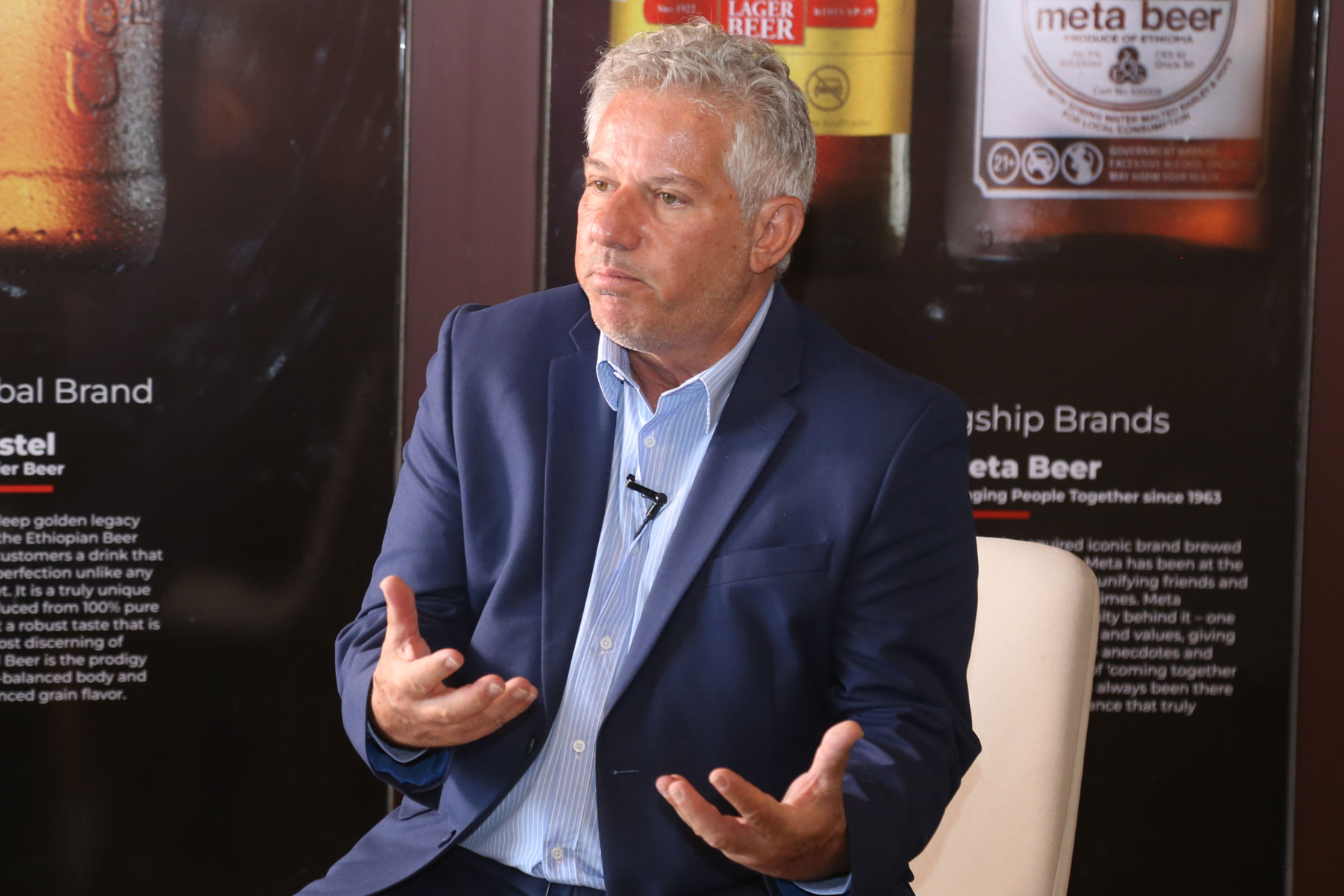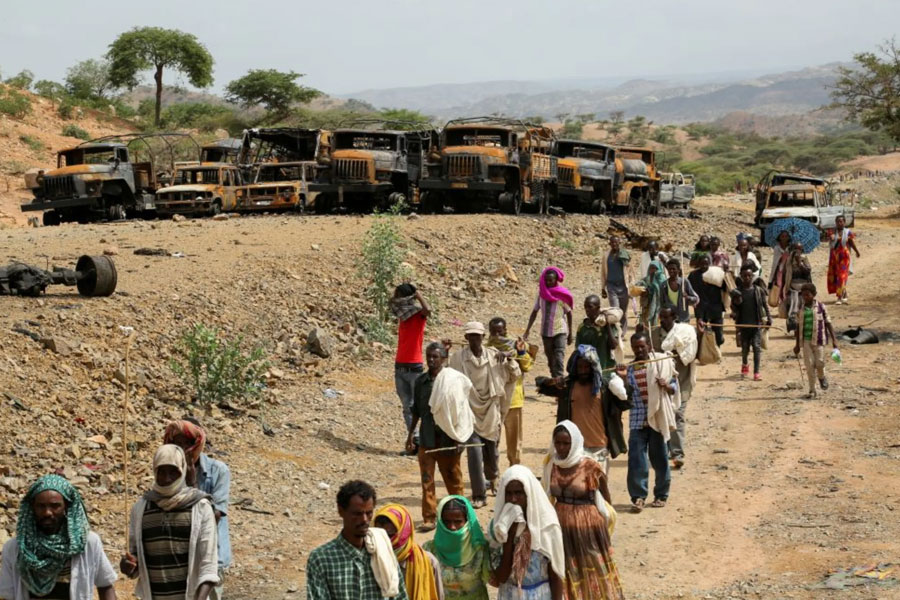
Radar | Sep 29,2024
Aug 17 , 2019.
The coming months pause an acid test for the administration of Prime Minister Abiy Ahmed (PhD). Having been swept into power by the widespread call for change, Abiy’s is an administration overburdened by expectations, perhaps unrealistic in many instances. Neither are his friends in the international community walking the talk where and when it matters most.
He may have been distracted from his initial mandate of ensuring the political space is conducive for competitive and credible national elections. His scorecard on that front is nothing but mixed. Perhaps dancing with political forces that joined his bandwagon along the way, Abiy has indeed wasted some preciously crucial time from focusing on what could have been indispensable moves. He could have prioritised the restoration of law and order and helped the economy remain in full swing.
Instead, the deceptive feeling of and the temptation from the permanence of power appears to have caught on for Abiy. He seems impatient. Unable to wait until he gets a mandate from the majority of the electorate, he wanted to be the moral tutor for the country and an embodiment of the national spirit, but in the way he and his allies defined it. Absolutism in morality. Many who may have different moral prescriptions from Abiy and his allies find this unsettling, if not disconcerting.
If only governing society and managing a national economy is that schematic. Alas! Ethiopia has evolved so much over the past 30 years in many frontiers, its economy being the most noticeable.
In a way, the political force that entrusted Abiy with power and his allies is a victim of its own making. The rapid growth of the last decade it spearheaded had created vast demand as it was meant to do. However, when the economy has not been able to come up with enough to meet demand, the party suffered from a leadership lacking perceptiveness in policy and incapacity to move to the next chapter.
The challenge of success, whether personal or national, is the rise of expectations. Meeting those expectations has not been an easy task. Even though Ethiopia’s pro-poor economic policy started to lift millions of the poorest of the poor out of abject poverty, it has not been able to curb the rise of income inequality. Among a restless youth, it fueled ressentiment, a psychological state resulting from suppressed feelings of envy and hatred and the impossibility to act them out.
In more ways than one, Abiy owes his rise to political power to this phenomenon. Growing economic inequality was behind the discontent and disenchantment of the youth that led to widespread protests, which resulted in the change in leadership and direction by the ruling party. The lull in the protests was premised on the hope and expectation that the new administration will bring in better days.
Meeting the expectations of an impatient, overwhelmingly young population is never easy even for wealthy nations, let alone for a developing country such as Ethiopia. It is a leash on leaders who are tempted by their own folly. It won’t be long before this same group consumed by a feeling of ressentiment turns on him and proves that it is impossible to govern.
Certainly, growing income inequality is not a uniquely Ethiopian problem. It is one of the common challenges across the world. A recent survey conducted in 15 developing countries found that 77pc of policymakers believe inequality to be a threat. It is especially so for a country in political transition and social transformation.
A young population locked in a rigid class structure, with little hope of income mobility, is a recipe for instability. Even though one may not be exactly enjoying the benefits of the country’s economic bounty today, as long as one sees a potential path to future possibilities, there is hope. A good example could be the once-popular expression, “The American Dream”: The perpetual hope that keeps the working class invested in the United States.
The dimming of such hope in Ethiopia is what makes the situation worrisome. The tendency of various political leaders tending to use that despair as fuel for power politics aggravates the situation. Income inequality is still one of the main factors that fuels polarisation, hence the potential for conflict.
It is in the midst of these that the coming national elections will be held, if indeed at all. The months ahead will be trying times for Ethiopia. How national elections will take place determines the capacity of the state to hold onto the centre.
With polarisation transforming to radicalisation and fueled by inequality, the challenge for the administration will be one of “ungovernability”.
Ungovernability happens when political forces fail to garner a majority in parliament or form a workable coalition that the government of the day fails to pass and enforce basic laws; systematic corruption of constitutional norms make the political process arbitrary, or even dangerous; and a series of demonstrations and public protests put the state and its leadership in paralysis.
These are all possible scenarios that may happen before and after the elections. Avoiding such possibilities requires a grand bargain by leaders and representatives of the various forces in society in good faith. There needs to be a long and torturous dialogue to reach painful compromises in the spirit of “give and take”.
So far, political leaders of the various parties and interests have not shown interactions in good faith with each other. The only exception to this has been the Memorandum of Understanding signed by representatives of over 100 political parties meant to govern their relationships. However, their commitment to it has been questioned in light of recent events.
These leaders must realise the potential danger and commit themselves and the people they mobilise to comply with the rules of the game agreed upon. They need to be careful not to exploit inequality for further polarisation and push to radicalisation. That is not an election strategy, that is a push for ungovernability that may lead to state collapse.
That should be a concern beyond Ethiopia’s borders. A country with over 100 million people imploding under the weight of its crises will not leave the international community as a bystander. Sadly, it is, and many of its diplomatic corps deployed in Addis Abeba lack this astute observation.
If there are any lessons the international community should take from the failures of similar situations in the past in many other countries, it is to avoid a shilly-shally attitude in dealing with leaders of various forces. They need to have clarity in their message and coherence in their approach. They will have to mobilise themselves to draw the red line against unacceptable actions that the protagonists may have in mind as their respective goals.
That could be a viable way of avoiding the mistake that led to disaster and catastrophe in Eastern Europe in the 1990s.
PUBLISHED ON
Aug 17,2019 [ VOL
20 , NO
1007]

Radar | Sep 29,2024

Fortune News | Apr 06,2019

Exclusive Interviews | May 11,2024

Year In Review | Jan 02,2024

Advertorials | Jul 03,2019

Fortune News | Feb 15,2020

Viewpoints | Feb 29,2020

Radar | Aug 16,2020

Fortune News | Apr 20,2019

Radar | Apr 25,2020

My Opinion | 131507 Views | Aug 14,2021

My Opinion | 127863 Views | Aug 21,2021

My Opinion | 125841 Views | Sep 10,2021

My Opinion | 123471 Views | Aug 07,2021

Dec 22 , 2024 . By TIZITA SHEWAFERAW
Charged with transforming colossal state-owned enterprises into modern and competitiv...

Aug 18 , 2024 . By AKSAH ITALO
Although predictable Yonas Zerihun's job in the ride-hailing service is not immune to...

Jul 28 , 2024 . By TIZITA SHEWAFERAW
Unhabitual, perhaps too many, Samuel Gebreyohannes, 38, used to occasionally enjoy a couple of beers at breakfast. However, he recently swit...

Jul 13 , 2024 . By AKSAH ITALO
Investors who rely on tractors, trucks, and field vehicles for commuting, transporting commodities, and f...

Jun 29 , 2025
Addis Abeba's first rains have coincided with a sweeping rise in private school tuition, prompting the city's education...

Jun 29 , 2025 . By BEZAWIT HULUAGER
Central Bank Governor Mamo Mihretu claimed a bold reconfiguration of monetary policy...

Jun 29 , 2025 . By BEZAWIT HULUAGER
The federal government is betting on a sweeping overhaul of the driver licensing regi...

Jun 29 , 2025 . By NAHOM AYELE
Gadaa Bank has listed 1.2 million shares on the Ethiopian Securities Exchange (ESX),...